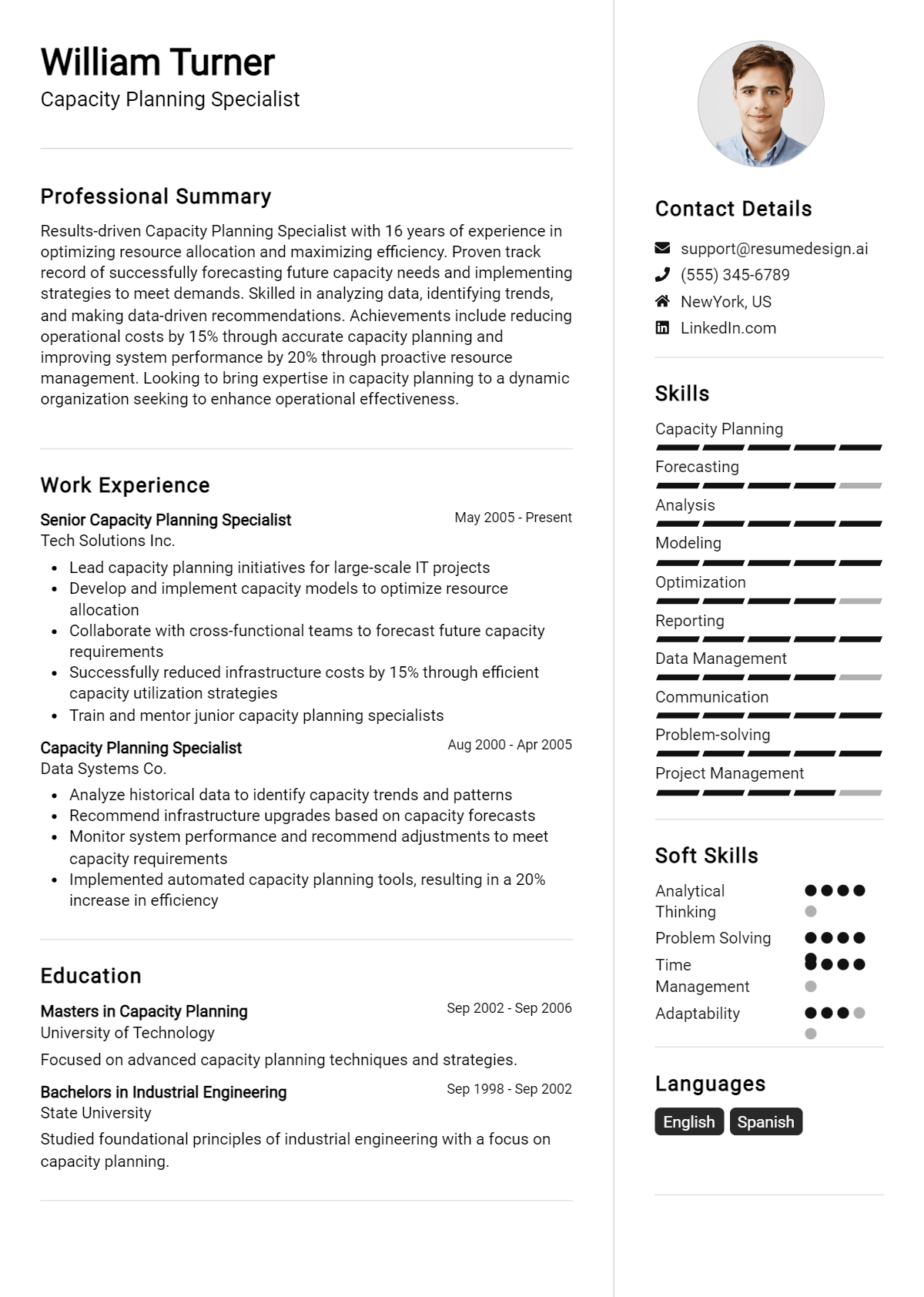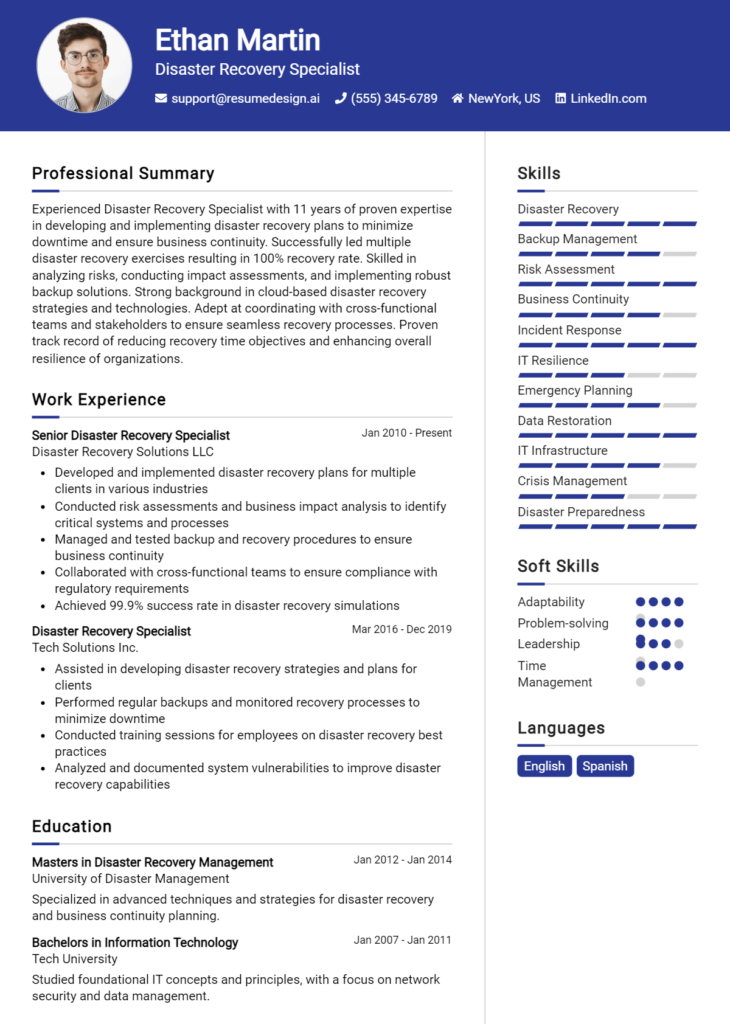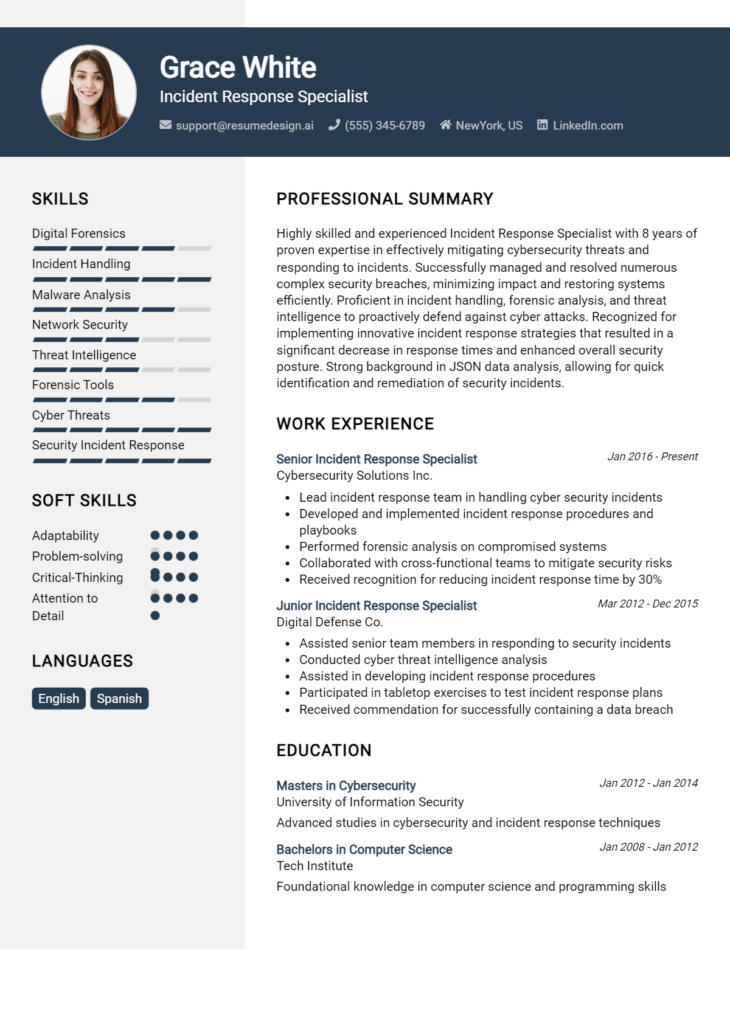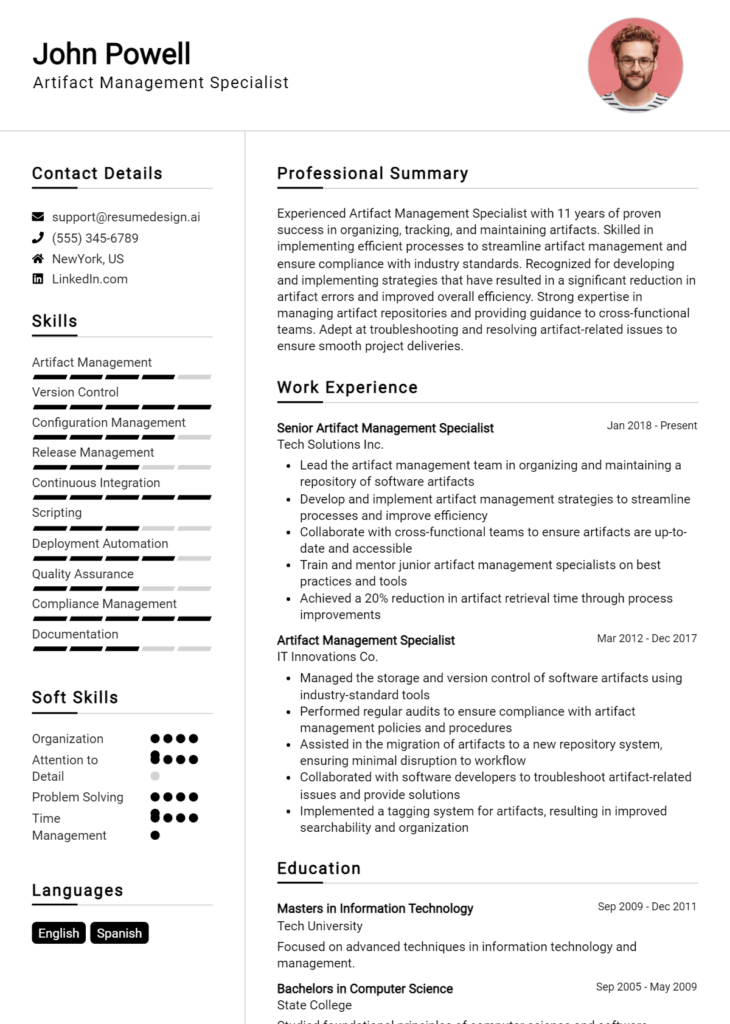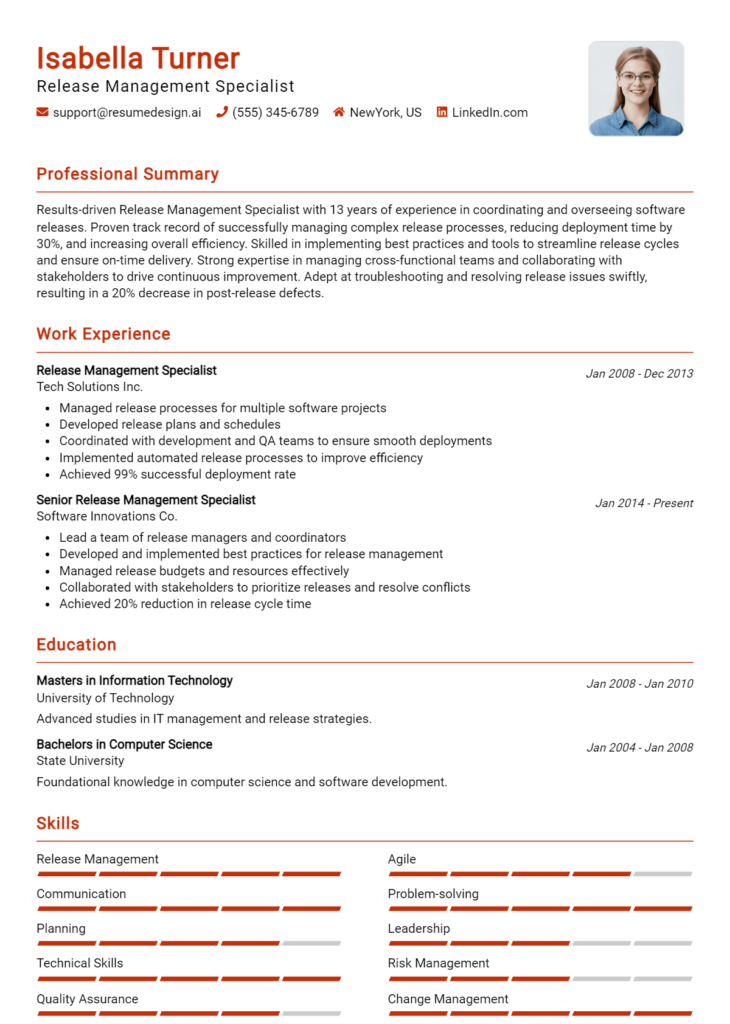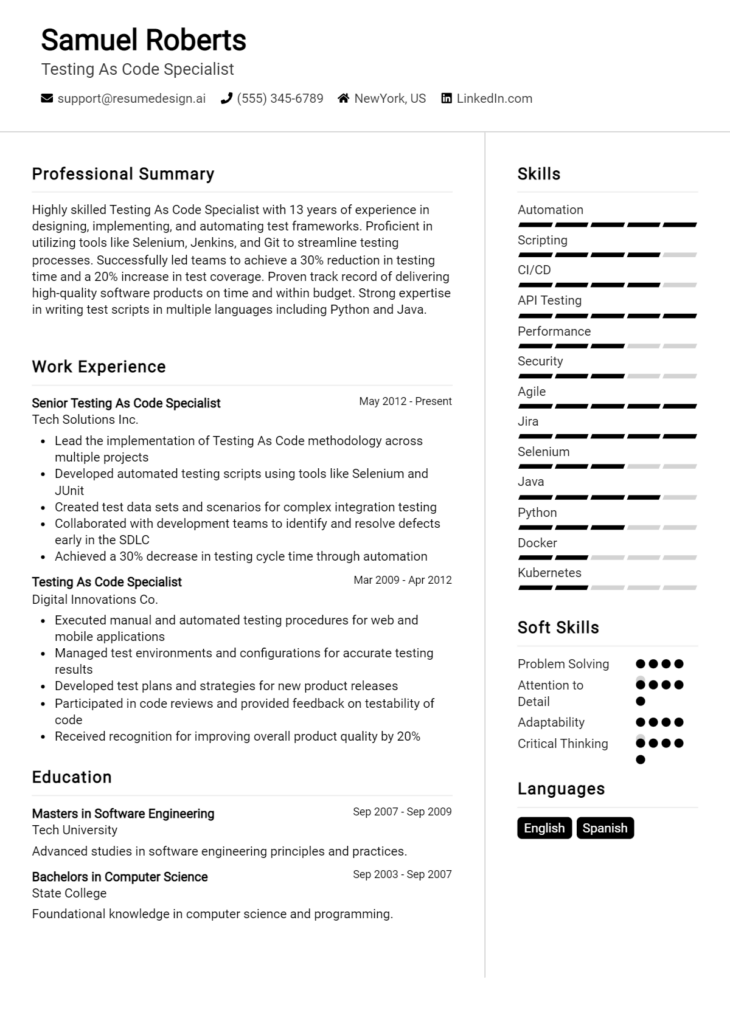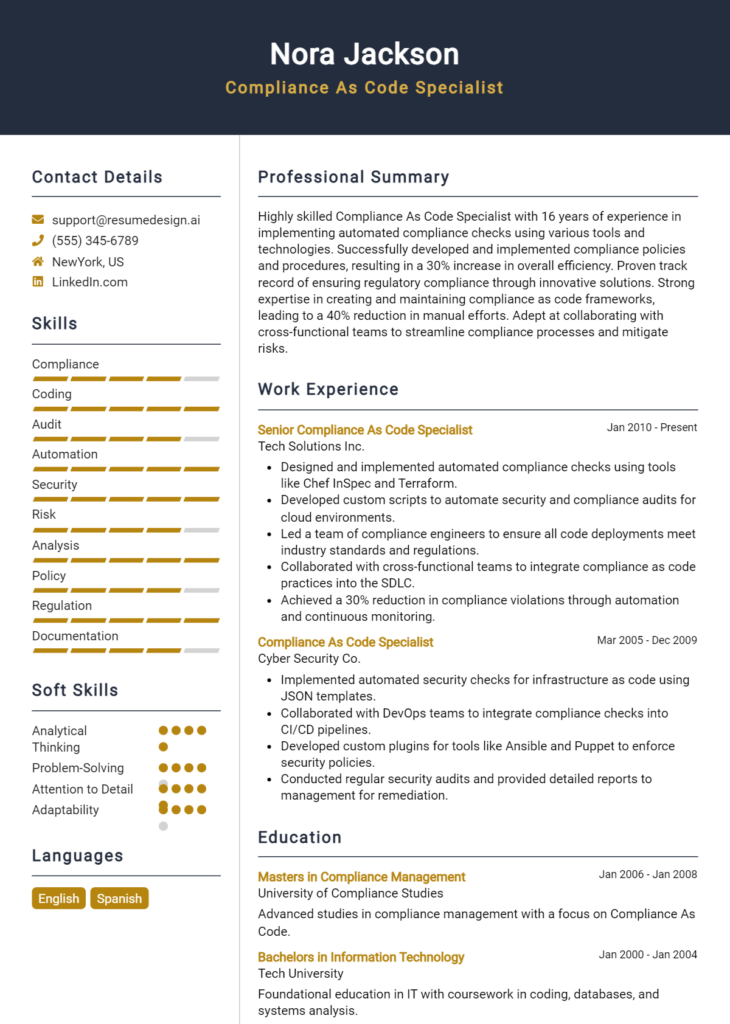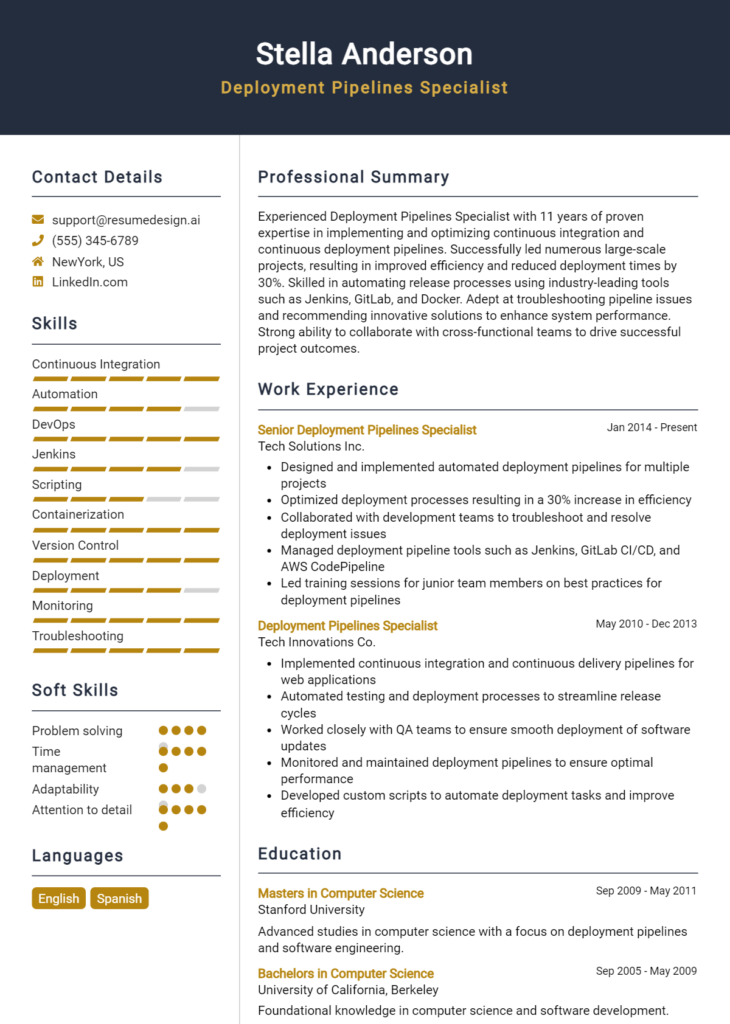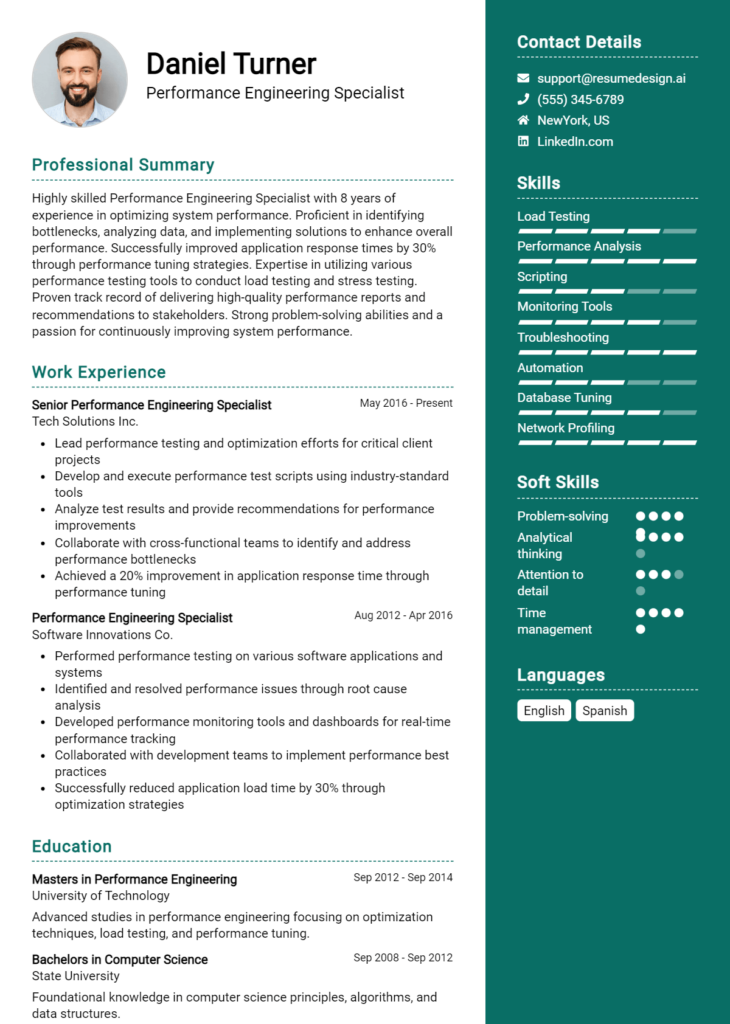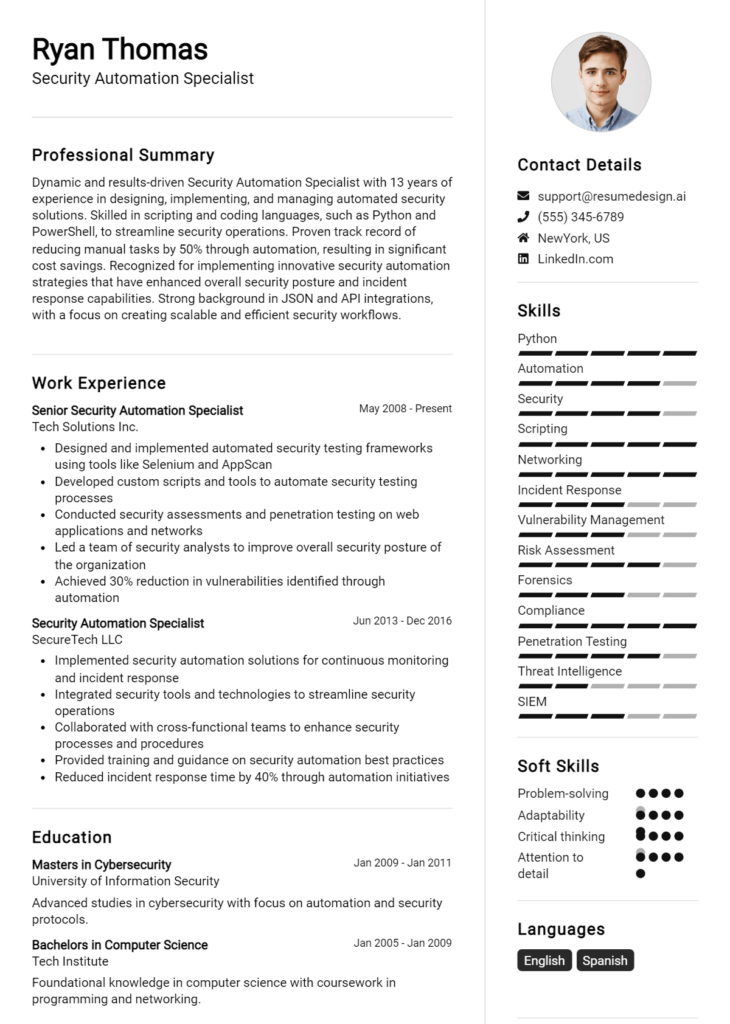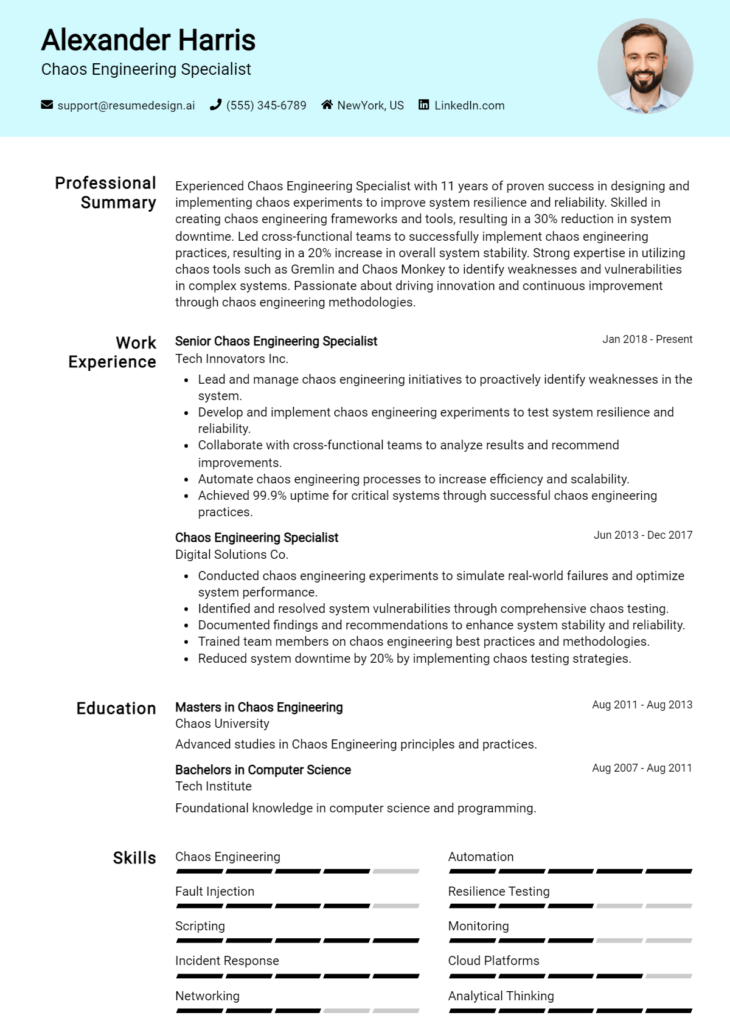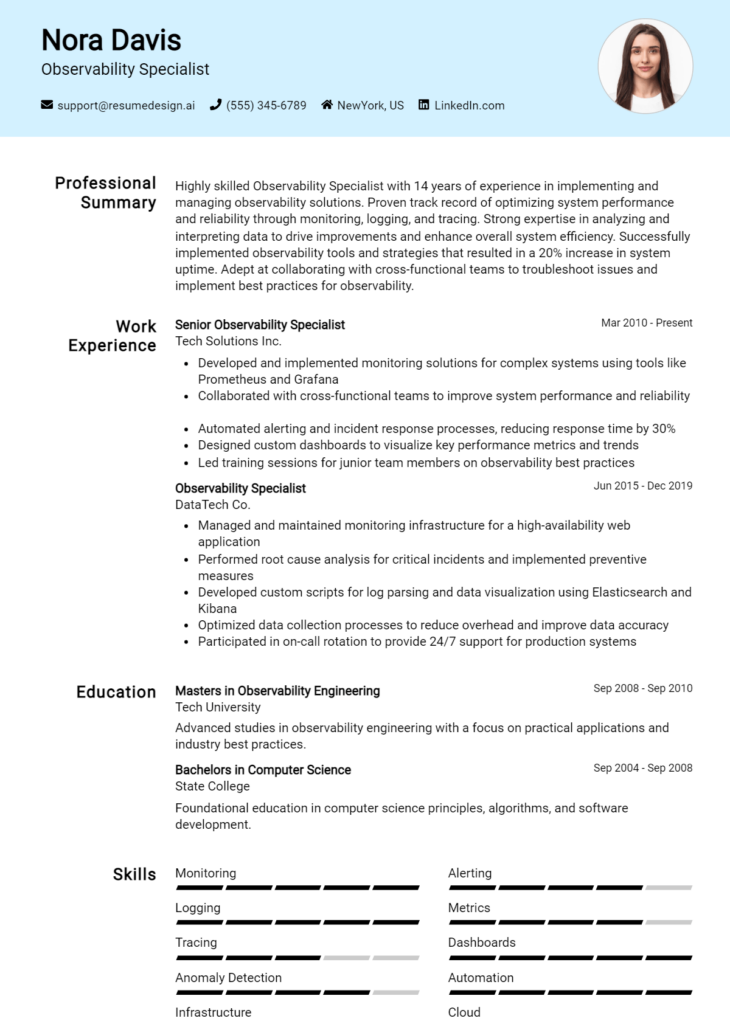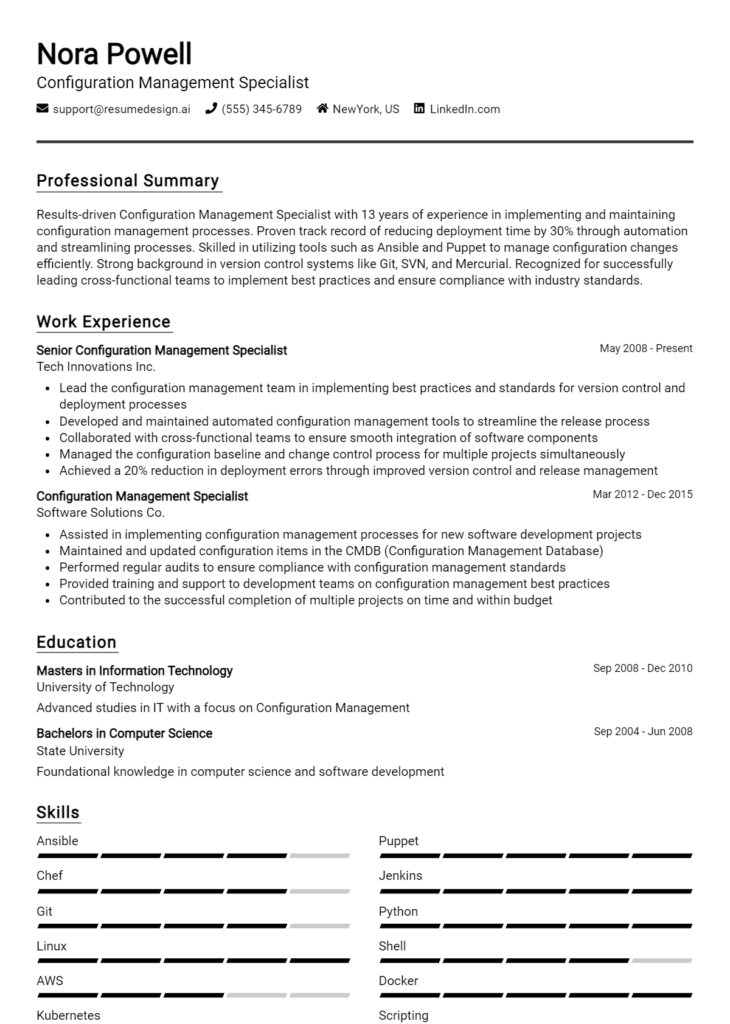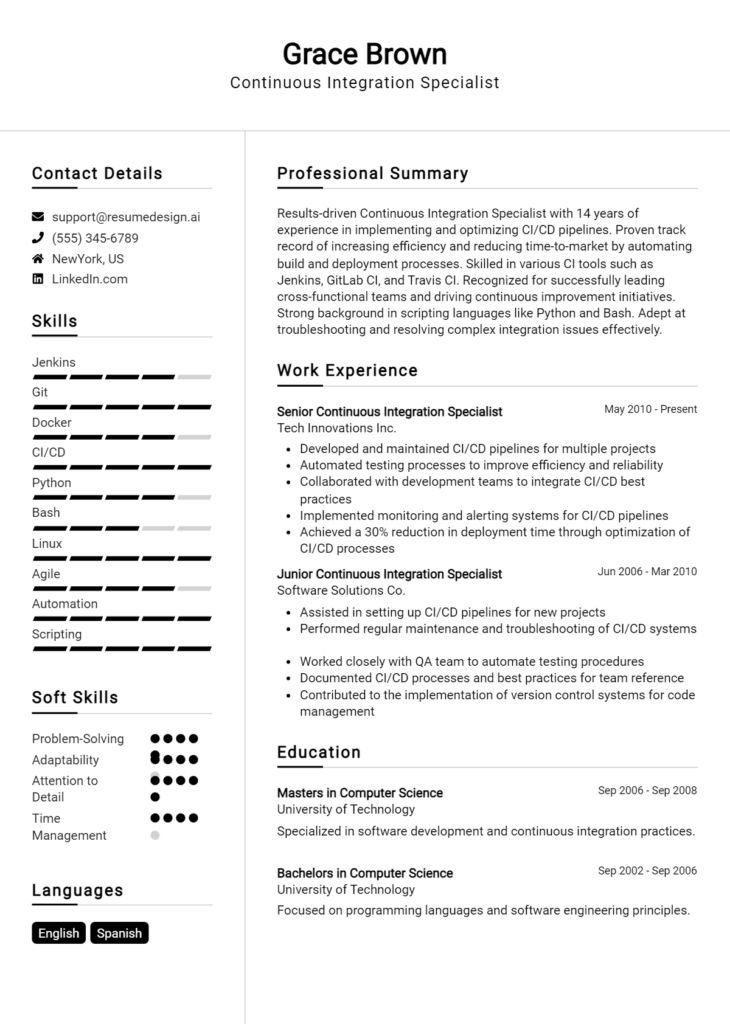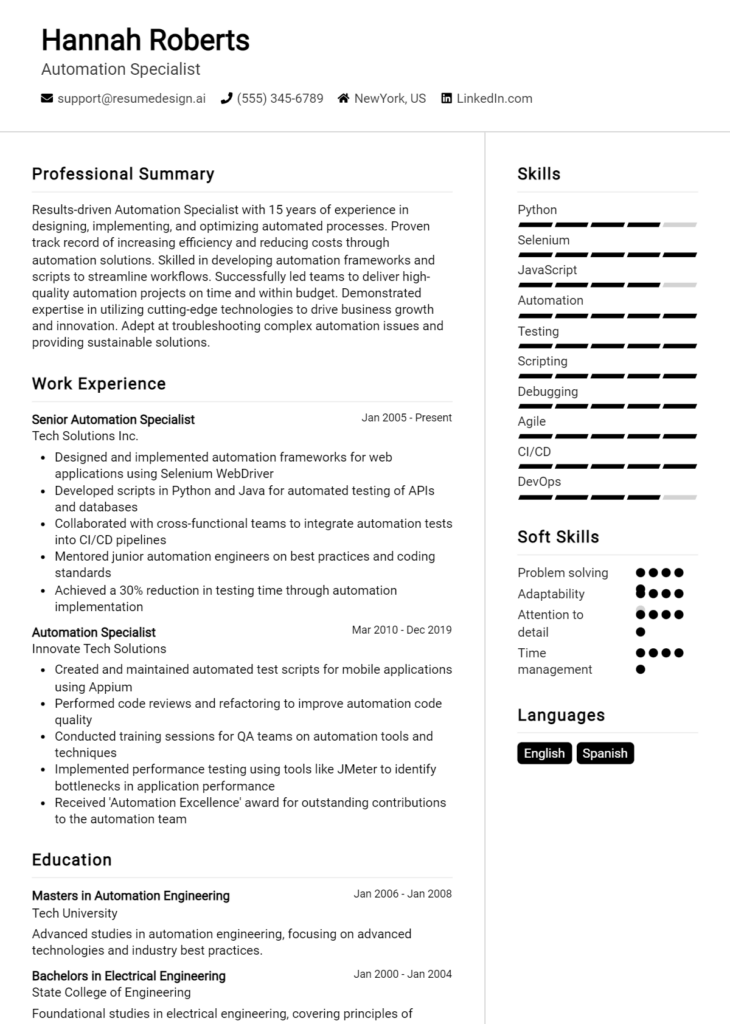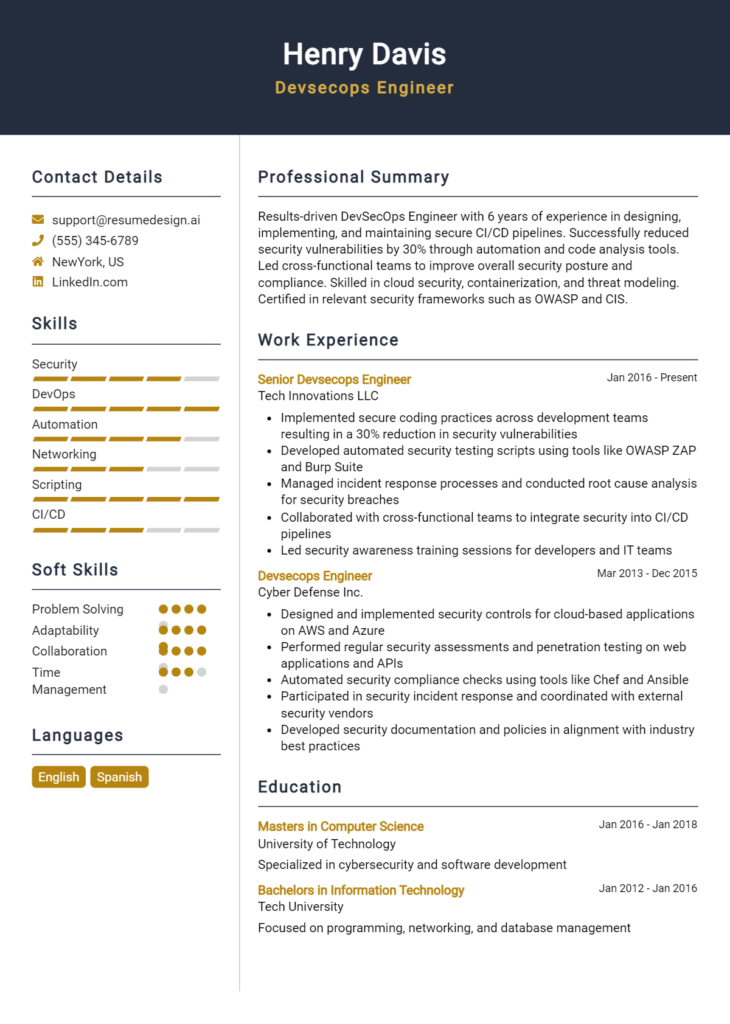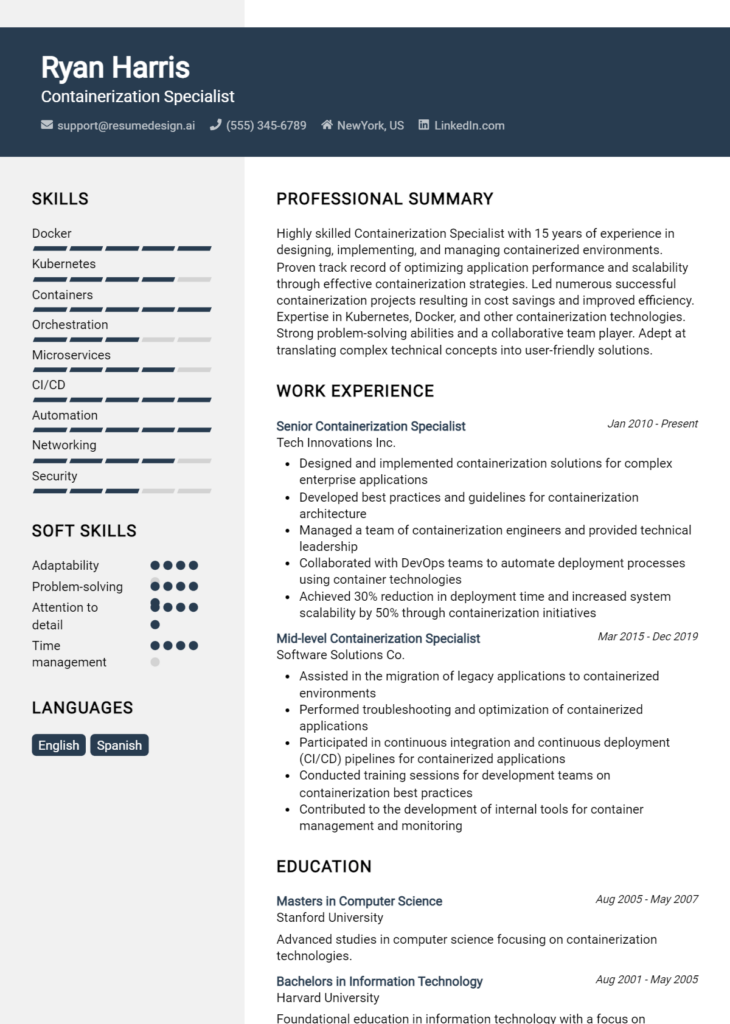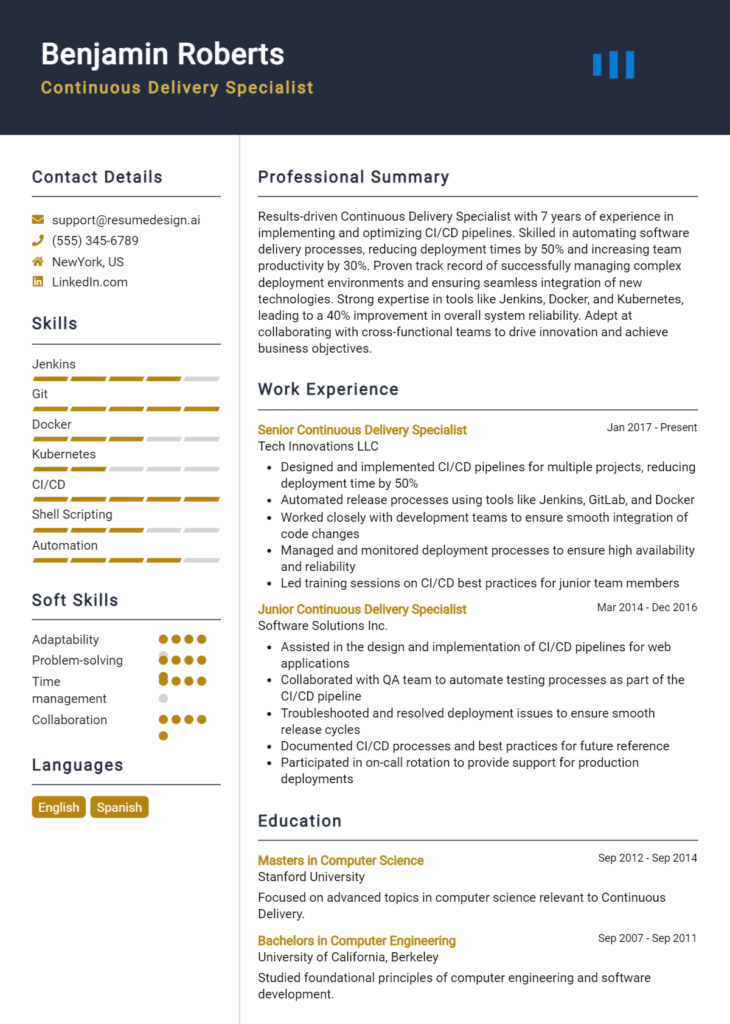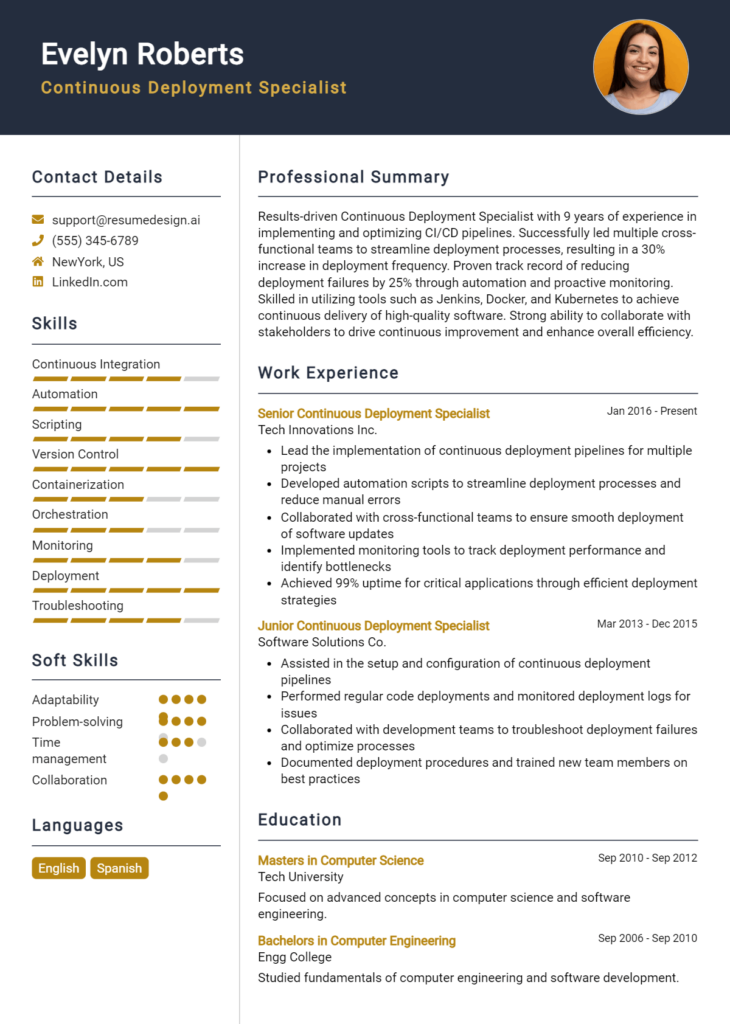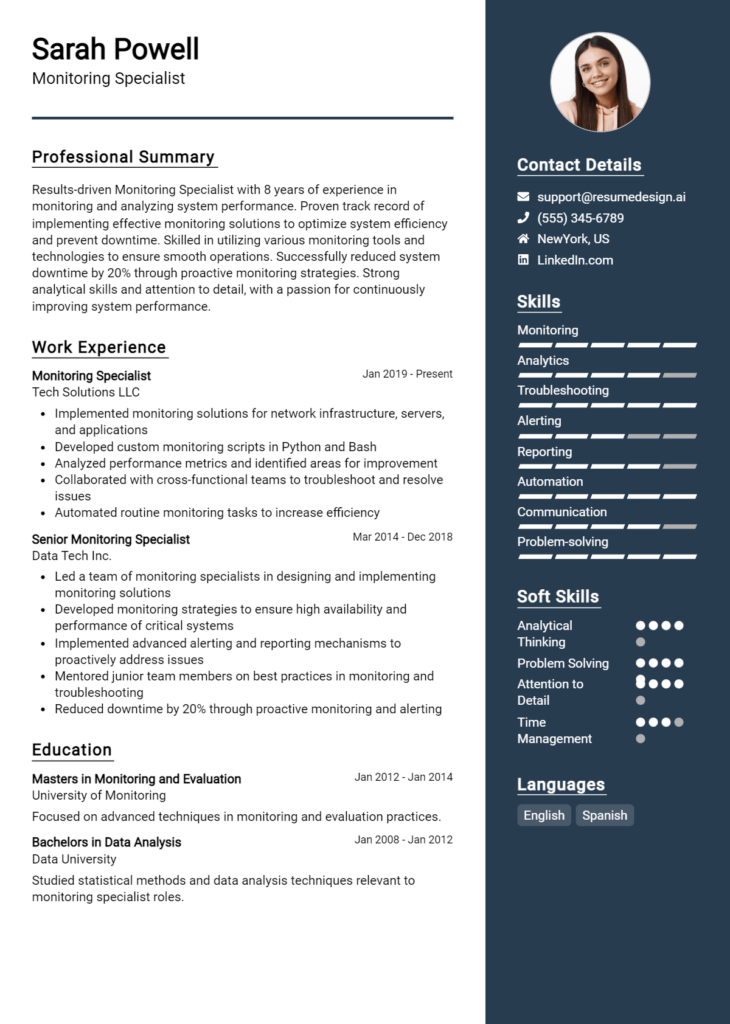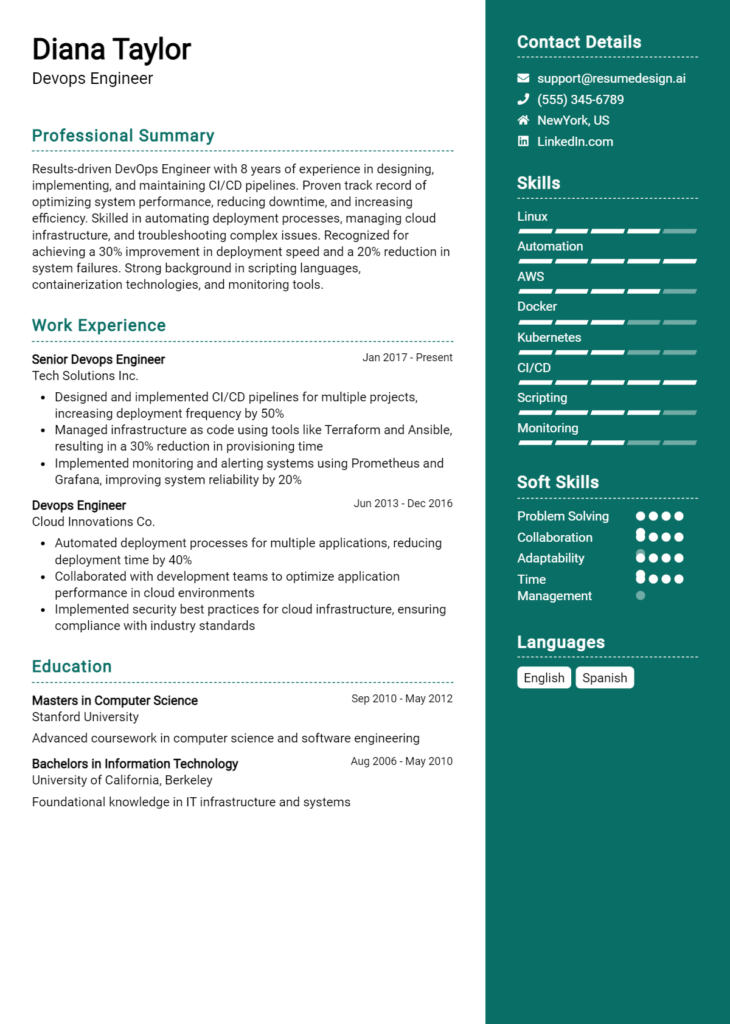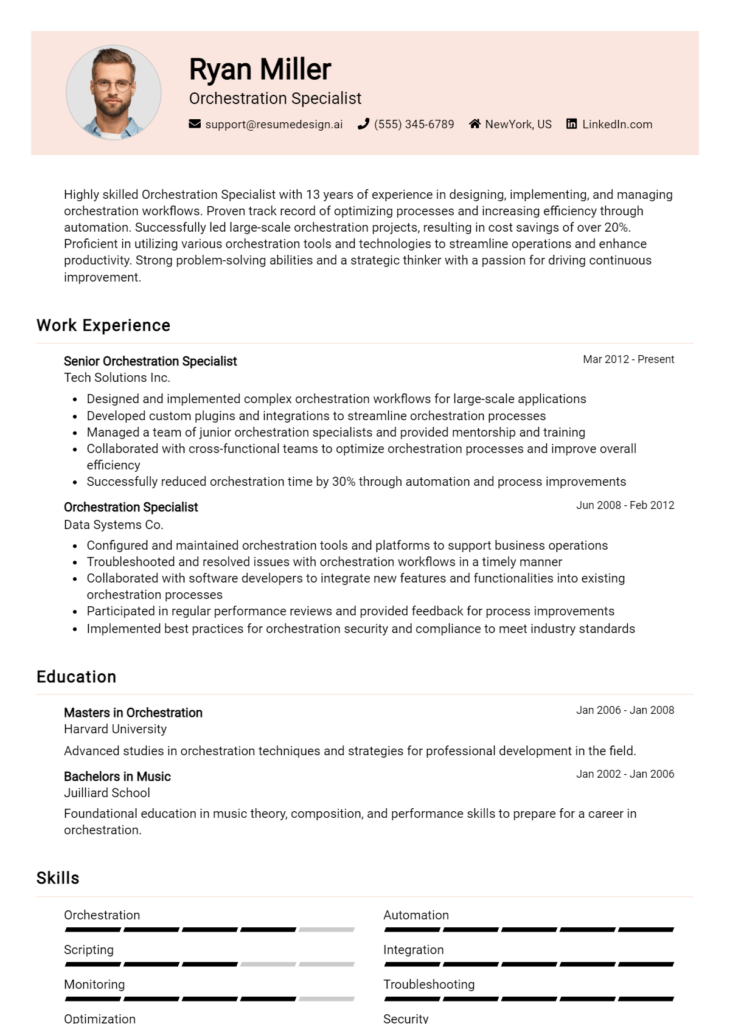Capacity Planning Specialist Core Responsibilities
A Capacity Planning Specialist plays a crucial role in aligning operational capacity with business demands, ensuring efficient resource allocation across departments. Key responsibilities include analyzing data trends, forecasting future needs, and collaborating with teams such as production, logistics, and finance to optimize workflows. Essential skills encompass strong analytical abilities, technical proficiency in planning software, and effective problem-solving skills. These competencies not only enhance operational efficiency but also drive the organization towards its strategic goals. A well-structured resume that highlights these qualifications can significantly increase job prospects.
Common Responsibilities Listed on Capacity Planning Specialist Resume
- Analyze current capacity and utilization metrics to identify improvement opportunities.
- Develop and maintain capacity models to predict future resource needs.
- Collaborate with cross-functional teams to align capacity with demand forecasts.
- Monitor production schedules and adjust plans as necessary.
- Prepare reports and presentations on capacity planning metrics for stakeholders.
- Utilize data analytics tools to enhance decision-making processes.
- Manage inventory levels to optimize resource allocation.
- Implement process improvements to enhance operational efficiency.
- Conduct risk assessments to mitigate potential capacity constraints.
- Facilitate training sessions on capacity planning best practices.
- Lead projects aimed at optimizing resource usage across departments.
- Stay updated with industry trends to inform capacity planning strategies.
High-Level Resume Tips for Capacity Planning Specialist Professionals
A well-crafted resume is crucial for Capacity Planning Specialist professionals, as it serves as the first impression a candidate makes on potential employers. In a competitive job market, your resume must not only highlight your skills but also showcase your achievements in a clear and compelling manner. A strong resume can set you apart from other candidates by demonstrating your ability to effectively manage resources, analyze data, and contribute to organizational success. This guide will provide practical and actionable resume tips specifically tailored for Capacity Planning Specialist professionals, ensuring that you present your qualifications in the best possible light.
Top Resume Tips for Capacity Planning Specialist Professionals
- Tailor your resume to the job description by incorporating relevant keywords and phrases.
- Highlight your experience with capacity planning tools and software, such as ERP systems and forecasting models.
- Quantify your achievements by using metrics to demonstrate the impact of your work, such as cost savings or improved resource utilization.
- Showcase relevant certifications or training that enhance your expertise in capacity planning and management.
- Include specific examples of successful projects or initiatives you've led or contributed to in previous roles.
- Emphasize your analytical skills and ability to interpret complex data to inform decision-making.
- Highlight your communication skills, particularly your ability to present data and insights to stakeholders.
- Keep your resume concise and focused, ideally limiting it to one or two pages, while still covering all critical information.
- Utilize a clean and professional layout that enhances readability and draws attention to important elements.
By implementing these tips, you can significantly increase your chances of landing a job in the Capacity Planning Specialist field. A well-structured and tailored resume will not only showcase your qualifications effectively but also demonstrate your commitment to the role, making you a more attractive candidate to potential employers.
Why Resume Headlines & Titles are Important for Capacity Planning Specialist
In the competitive field of capacity planning, a resume headline or title serves as a critical first impression, encapsulating a candidate's core qualifications and drawing the attention of hiring managers. A well-crafted headline can act as a powerful hook, succinctly summarizing the applicant's expertise and setting the tone for the rest of the resume. It is essential that this headline is concise, relevant, and tailored directly to the specific role of a Capacity Planning Specialist, ensuring that it resonates with the expectations and requirements of the position being applied for.
Best Practices for Crafting Resume Headlines for Capacity Planning Specialist
- Keep it concise: Aim for a headline that is no longer than 10-12 words.
- Be role-specific: Use terminology that reflects the capacity planning field.
- Highlight key strengths: Focus on core skills or achievements that set you apart.
- Use quantifiable metrics: If possible, incorporate numbers to showcase your impact.
- Stay relevant: Ensure the headline aligns with the job description and company goals.
- Avoid clichés: Steer clear of overused phrases that may dilute your message.
- Use active language: Choose strong verbs to convey confidence and proactivity.
- Tailor for each application: Customize your headline for each position you apply for.
Example Resume Headlines for Capacity Planning Specialist
Strong Resume Headlines
"Results-Driven Capacity Planning Specialist with 5+ Years of Experience in Supply Chain Optimization"
“Strategic Capacity Planner with Proven Track Record in Cost Reduction and Efficiency Improvements”
“Dynamic Capacity Planning Expert Specializing in Data Analysis and Forecasting Techniques”
Weak Resume Headlines
“Seeking a Job in Capacity Planning”
“Experienced Professional”
Effective headlines, like those in the strong category, are impactful because they immediately convey specific skills and experiences relevant to the role of a Capacity Planning Specialist. They highlight the candidate's unique value proposition, making it easier for hiring managers to see their potential contributions. Conversely, weak headlines fail to impress because they are vague and lack specificity, leaving hiring managers with little information to assess the candidate's suitability for the position. A compelling headline should serve as a clear, concise introduction that sparks interest and invites further exploration of the resume.
Writing an Exceptional Capacity Planning Specialist Resume Summary
A well-crafted resume summary is crucial for a Capacity Planning Specialist, as it serves as the first impression for hiring managers. This introductory paragraph succinctly highlights the candidate's key skills, relevant experience, and significant accomplishments, enabling employers to quickly assess their qualifications. A strong summary is concise yet impactful, tailored to the specific job description, and effectively communicates why the candidate is the ideal fit for the role. By capturing attention immediately, a compelling resume summary can set the tone for the rest of the application and increase the candidate's chances of landing an interview.
Best Practices for Writing a Capacity Planning Specialist Resume Summary
- Quantify Achievements: Use specific numbers and metrics to demonstrate your impact and contributions.
- Focus on Relevant Skills: Highlight key skills and expertise that align with the job description.
- Tailor for the Job: Customize the summary for each position you apply for, reflecting the specific qualifications sought by the employer.
- Be Concise: Keep the summary brief, ideally between 2-4 sentences, to maintain the reader's attention.
- Use Action Words: Start sentences with strong action verbs to convey confidence and decisiveness.
- Showcase Industry Knowledge: Include relevant industry terminology to demonstrate familiarity with capacity planning processes.
- Highlight Problem-Solving Abilities: Emphasize your capacity to analyze data and develop strategies that optimize resources.
- Include Soft Skills: Mention interpersonal skills, such as communication and teamwork, which are essential for collaboration in capacity planning.
Example Capacity Planning Specialist Resume Summaries
Strong Resume Summaries
Dynamic Capacity Planning Specialist with over 7 years of experience in optimizing resource allocation, achieving a 30% reduction in operational costs through data-driven strategies. Proven ability to analyze market trends and forecast demand, resulting in a 25% increase in service efficiency.
Results-oriented Capacity Planning Specialist with a track record of enhancing supply chain processes. Successfully implemented a new inventory management system that decreased stockouts by 40% and improved overall fulfillment rates by 20% within one year.
Dedicated professional with expertise in capacity analysis and demand forecasting. Developed and executed a capacity planning model that improved project lead times by 15%, directly contributing to increased customer satisfaction and retention.
Weak Resume Summaries
Experienced planner with skills in managing resources and logistics. Looking for a new opportunity to apply my knowledge in a dynamic environment.
Capacity Planning Specialist with a background in planning and forecasting. I am eager to contribute to a company and help improve processes.
The examples of strong resume summaries are effective because they are specific, quantifiable, and directly relevant to the capacity planning field. They clearly articulate the candidate's accomplishments and skills, showcasing their value to potential employers. In contrast, the weak resume summaries lack detail, specificity, and measurable outcomes, making them less compelling and memorable to hiring managers. These summaries fail to convey a strong sense of expertise or unique contributions, which are essential in a competitive job market.
Work Experience Section for Capacity Planning Specialist Resume
The work experience section of a Capacity Planning Specialist resume serves as a critical component that allows candidates to demonstrate their technical skills, leadership abilities, and effectiveness in delivering high-quality products. This section provides a platform for candidates to highlight their hands-on experience in capacity planning, resource allocation, and team management. By quantifying achievements and aligning their experience with industry standards, candidates can clearly articulate their value to potential employers, making a compelling case for why they are the best fit for the role.
Best Practices for Capacity Planning Specialist Work Experience
- Use specific metrics to quantify achievements, such as percentage improvements in efficiency or cost savings.
- Highlight technical skills related to forecasting, data analysis, and resource management.
- Demonstrate leadership by describing experiences in managing cross-functional teams or projects.
- Include examples of successful collaboration with stakeholders to align capacity with demand.
- Showcase knowledge of relevant tools and software used in capacity planning.
- Tailor descriptions to reflect industry standards and specific job requirements.
- Emphasize continuous improvement initiatives that led to enhanced operational performance.
- Utilize action verbs to convey a sense of proactivity and ownership in past roles.
Example Work Experiences for Capacity Planning Specialist
Strong Experiences
- Successfully led a capacity planning initiative that improved resource allocation accuracy by 30%, resulting in a 15% reduction in operational costs.
- Implemented a new forecasting model that increased demand prediction accuracy by 25%, enabling the team to meet production goals consistently.
- Collaborated with IT and operations teams to deploy a capacity management software tool, enhancing reporting capabilities and reducing manual workload by 40%.
- Managed a cross-functional team of 10, driving a project that streamlined supply chain processes, which led to a 20% increase in overall throughput.
Weak Experiences
- Responsible for capacity planning tasks without any specific outcomes mentioned.
- Worked with teams to improve efficiency but did not specify how or what was achieved.
- Assisted in projects that may have involved capacity planning but lacked detail on contributions.
- Involved in meetings regarding capacity planning with no quantifiable impact noted.
The examples provided showcase the difference between strong and weak experiences in a resume. Strong experiences are characterized by specific, quantifiable achievements and clear demonstrations of technical skills and leadership capabilities. They articulate the candidate's impact and contributions, making their experience relevant and compelling. In contrast, weak experiences lack detail and measurable outcomes, which fail to convey the candidate's effectiveness or expertise in the capacity planning domain. By focusing on concrete results and collaborative efforts, candidates can significantly enhance the strength of their work experience section.
Education and Certifications Section for Capacity Planning Specialist Resume
The education and certifications section of a Capacity Planning Specialist resume plays a pivotal role in establishing a candidate's qualifications and expertise in the field. This section not only showcases the candidate's academic background but also emphasizes their commitment to continuous learning through industry-relevant certifications and specialized training. By providing details about relevant coursework, certifications, and ongoing educational pursuits, candidates can greatly enhance their credibility and demonstrate alignment with the specific requirements of the job role, making them more appealing to potential employers.
Best Practices for Capacity Planning Specialist Education and Certifications
- Include degrees that are directly related to capacity planning, such as operations management, supply chain management, or industrial engineering.
- List industry-recognized certifications, such as Certified Supply Chain Professional (CSCP) or APICS certifications, to demonstrate expertise.
- Highlight any relevant coursework that pertains to capacity planning, data analysis, or resource management.
- Ensure that the format is clear and easy to read, using bullet points to separate different qualifications.
- Provide dates of completion for certifications and degrees to indicate the recency of your qualifications.
- Include any specialized training or workshops that focus on capacity planning tools and methodologies.
- Tailor this section to match the specific requirements of the job description, emphasizing skills that the employer seeks.
- Consider mentioning any relevant projects or case studies from your education that demonstrate practical application of capacity planning concepts.
Example Education and Certifications for Capacity Planning Specialist
Strong Examples
- Bachelor of Science in Industrial Engineering, XYZ University, 2020
- Certified Supply Chain Professional (CSCP), APICS, 2021
- Master's Certificate in Project Management, ABC Institute, 2022
- Relevant Coursework: Operations Management, Demand Forecasting, Inventory Control
Weak Examples
- Bachelor of Arts in History, DEF University, 2015
- Certification in Microsoft Office Applications, 2018
- Online Course: Introduction to Photography, 2020
- High School Diploma, GHI High School, 2014
The strong examples are considered effective because they directly relate to the skills and knowledge required for a Capacity Planning Specialist, showcasing relevant degrees, industry-recognized certifications, and pertinent coursework. In contrast, the weak examples highlight qualifications that are either unrelated to capacity planning or do not demonstrate the level of expertise and specialization needed for the role, thereby failing to enhance the candidate's credibility in the field.
Top Skills & Keywords for Capacity Planning Specialist Resume
As a Capacity Planning Specialist, showcasing your skills on your resume is crucial for standing out in a competitive job market. Employers look for candidates who possess a blend of technical expertise and interpersonal abilities, as these skills ensure efficient resource management and strategic decision-making. A well-crafted resume that highlights both hard and soft skills can demonstrate your capability to analyze data, forecast needs, and collaborate effectively with various teams. To help you create an impactful resume, we have compiled a list of essential skills that you should consider including, which will not only reflect your qualifications but also align with the demands of the role.
Top Hard & Soft Skills for Capacity Planning Specialist
Soft Skills
- Analytical Thinking
- Problem-Solving
- Communication Skills
- Team Collaboration
- Time Management
- Adaptability
- Attention to Detail
- Critical Thinking
- Conflict Resolution
- Negotiation Skills
- Decision-Making
- Customer Focus
- Project Management
- Leadership Abilities
- Creativity
- Interpersonal Skills
- Stakeholder Engagement
- Strategic Planning
Hard Skills
- Data Analysis
- Statistical Modeling
- Forecasting Techniques
- Capacity Management Software (e.g., SAP, Oracle)
- Supply Chain Management
- Demand Planning
- Inventory Management
- Performance Metrics Development
- Microsoft Excel (Advanced)
- Project Management Tools (e.g., MS Project, Trello)
- Database Management
- Financial Acumen
- Business Intelligence Tools (e.g., Tableau, Power BI)
- Process Improvement Methodologies (e.g., Lean, Six Sigma)
- Risk Assessment
- Technology Integration
- Reporting and Documentation
By integrating these skills into your resume, you can effectively convey your qualifications and readiness for the role of a Capacity Planning Specialist. Remember to complement your skills with relevant work experience to provide a comprehensive overview of your professional capabilities.
Stand Out with a Winning Capacity Planning Specialist Cover Letter
Dear [Hiring Manager's Name],
I am writing to express my interest in the Capacity Planning Specialist position at [Company Name], as advertised on [where you found the job posting]. With a robust background in supply chain management and data analytics, combined with my passion for optimizing operational efficiency, I am excited about the opportunity to contribute to your team's success. My experience in analyzing capacity needs and developing strategic plans aligns seamlessly with [Company Name]'s goals to enhance productivity and resource utilization.
In my previous role at [Previous Company Name], I successfully led several capacity planning initiatives that resulted in a 20% reduction in operational costs while improving service delivery timelines. By collaborating with cross-functional teams, I was able to identify bottlenecks in the workflow and implement data-driven solutions that enhanced performance metrics. My proficiency in utilizing forecasting tools and software allowed me to predict demand fluctuations accurately, ensuring that resources were allocated effectively and efficiently.
I am particularly impressed by [Company Name]'s commitment to innovation and continuous improvement. I am eager to bring my analytical skills and strategic mindset to your organization, helping to create capacity plans that not only meet current demands but also anticipate future trends. My strong communication skills and collaborative approach will enable me to work effectively with diverse teams, ensuring that everyone is aligned toward achieving our shared objectives.
Thank you for considering my application. I am looking forward to the opportunity to discuss how my experience and skills can contribute to the ongoing success of [Company Name]. I am eager to bring my expertise in capacity planning to your esteemed company and am excited about the possibility of working together to drive operational excellence.
Sincerely,
[Your Name]
[Your Contact Information]
Common Mistakes to Avoid in a Capacity Planning Specialist Resume
When crafting a resume for the role of a Capacity Planning Specialist, it's crucial to present your skills and experiences effectively to stand out in a competitive job market. However, many candidates make common mistakes that can undermine their chances of landing an interview. Understanding these pitfalls can help you create a more impactful resume that highlights your qualifications and expertise in capacity planning.
Lack of Specific Metrics: Failing to include quantifiable achievements can make your accomplishments seem less significant. Use specific numbers to demonstrate your impact, such as "increased capacity utilization by 20%."
Generic Job Descriptions: Using vague or overly general descriptions of your previous roles can leave employers unclear about your specific contributions. Tailor your job descriptions to reflect relevant responsibilities and outcomes.
Ignoring Relevant Skills: Omitting key skills that are essential for capacity planning can weaken your resume. Ensure you include technical skills, analytical abilities, and software proficiencies that are pertinent to the role.
Overly Complicated Language: Using jargon or overly complex language can make your resume difficult to read. Aim for clarity and simplicity to ensure your qualifications are easily understood.
Neglecting to Customize: Sending out a one-size-fits-all resume can diminish your chances. Customize your resume for each position by aligning your skills and experiences with the specific requirements of the job.
Focusing on Duties Instead of Achievements: Simply listing job duties without emphasizing achievements may fail to capture the attention of hiring managers. Focus on what you accomplished in each role, showcasing your effectiveness.
Ignoring the Power of Keywords: Skipping relevant industry keywords can hurt your chances, especially if your resume is scanned by Applicant Tracking Systems (ATS). Make sure to incorporate important terms from the job description.
Poor Formatting: A cluttered or unprofessional layout can detract from your qualifications. Use clear headings, bullet points, and consistent formatting to make your resume visually appealing and easy to navigate.
Conclusion
As a Capacity Planning Specialist, you play a crucial role in ensuring that an organization's resources are effectively allocated to meet current and future demands. Key responsibilities include analyzing data to predict capacity needs, collaborating with various departments to align strategies, and optimizing resource utilization to enhance operational efficiency. Your expertise not only helps in managing costs but also drives productivity, making you an invaluable asset to any organization.
In summary, understanding the significance of your role and the skills required can help you stand out in this competitive field. It’s essential to present a well-crafted resume that highlights your experience and capabilities effectively. To assist you in this endeavor, consider utilizing the many resources available to enhance your job application materials.
Take the first step towards improving your job prospects by reviewing your Capacity Planning Specialist resume today. Explore helpful tools such as resume templates, a user-friendly resume builder, and insightful resume examples tailored to your profession. Don’t forget to check out cover letter templates to ensure your application stands out. Act now and elevate your career potential!

